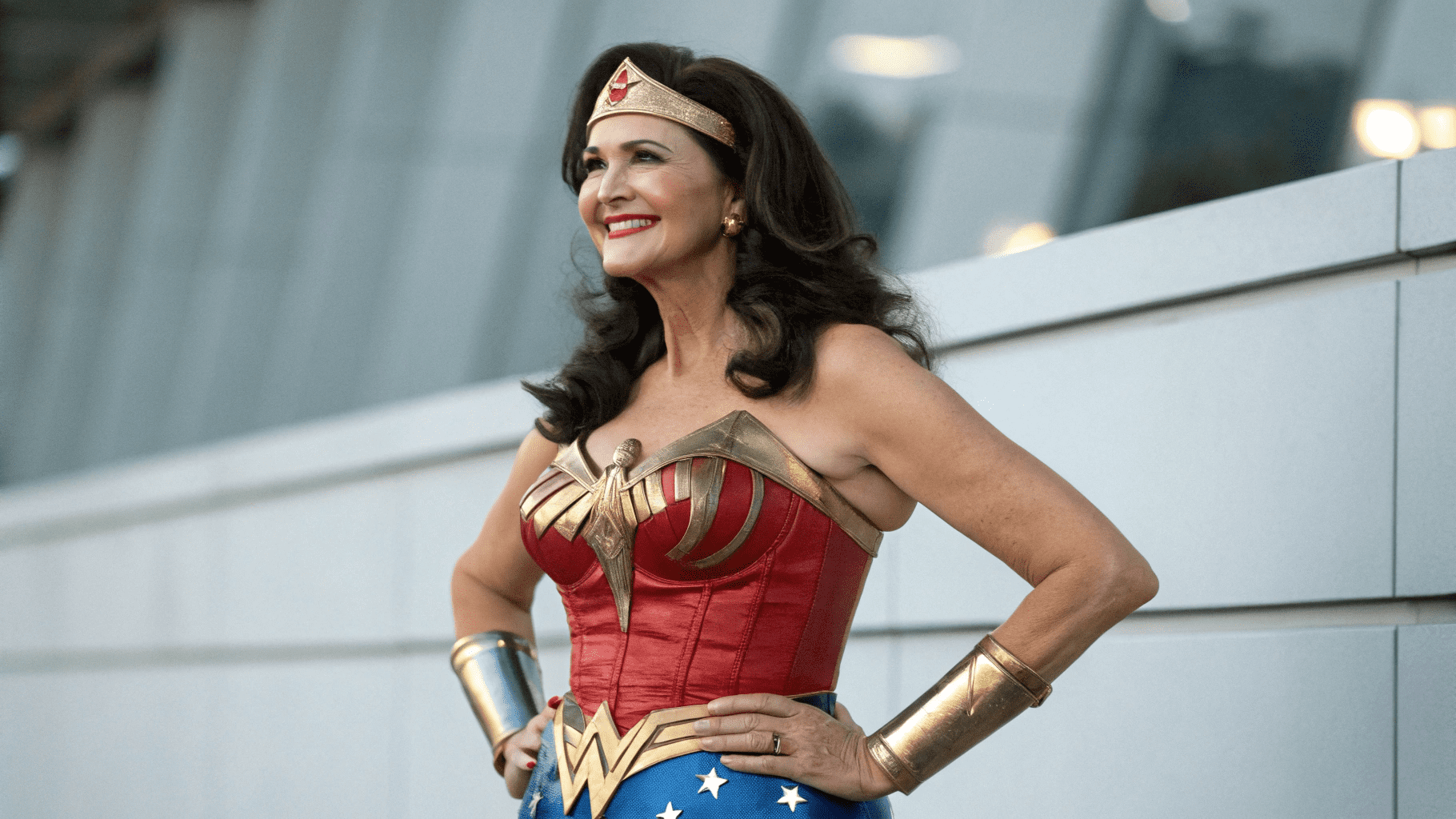
Taeekrazzy Leek: Rising Social Media Star to Watch in 2025
August 6, 2025
Code Promo Réduction Sunology Sun_rjhomesolar
August 11, 2025Lynda Carter is a name that continues to echo through the halls of pop culture, especially among fans of superheroes and 1970s television. Best known for her groundbreaking role as Wonder Woman, Carter transformed the way female heroes were portrayed on screen. With a blend of beauty, strength, and sincerity, she became a cultural icon whose legacy endures to this day. From her beginnings as Miss World USA to her roles in modern media, Carter’s impact spans decades. This article explores her life, career, and influence, while also comparing her legacy to other actresses who have portrayed Wonder Woman.
Lynda Carter’s Early Life & Pageant Success
Lynda Carter was born on July 24, 1951, in Phoenix, Arizona. From an early age, she displayed a love for music and performance, which led her to pursue a career in entertainment. Carter’s early life was marked by musical performances in high school and local bands, where her charisma and presence began to shine. Her beauty and charm soon led her into the world of pageantry, setting the stage for her eventual stardom.
In 1972, Carter won the title of Miss World USA, a moment that propelled her into the spotlight. This recognition not only gave her national fame but also opened doors in Hollywood. Her combination of beauty, poise, and natural grace made her an ideal candidate for television roles. Her pageant success laid a strong foundation for her acting career and helped position her as a standout talent ready to take on the role that would define her legacy.
How Lynda Carter Became Wonder Woman in the 1970s
Lynda Carter rose to international fame when she was cast as Wonder Woman in the 1975 live-action television series. Producers were looking for someone who embodied both strength and elegance, and Carter proved to be the perfect fit. Her portrayal of Diana Prince/Wonder Woman captivated audiences with its combination of athleticism, sincerity, and charm.
The show became a cultural phenomenon, airing for three seasons and leaving a lasting impression on pop culture. Carter’s unique portrayal brought a mix of grace and empowerment that few actresses at the time could match. She wasn’t just playing a superhero—she became a symbol of strength and independence for women around the world. Her performance set a benchmark for all future interpretations of the character.
Cathy Lee Crosby: The Predecessor to Lynda Carter
Before Lynda Carter’s iconic performance, Cathy Lee Crosby portrayed Wonder Woman in a 1974 TV movie pilot. However, Crosby’s version of the character was significantly different from the comic book depiction. She wore a more conservative costume and played a character more aligned with a secret agent than a superhero. The pilot didn’t resonate with audiences as expected.
When Lynda Carter took on the role just a year later, her performance quickly overshadowed Crosby’s. Carter embraced the full superhero identity, complete with the classic costume and superpowers. The public response was overwhelmingly positive, and Carter’s version became the definitive live-action Wonder Woman. Crosby’s portrayal faded into obscurity, while Carter’s career soared to new heights.
Live‑Action Legacy: Lynda Carter vs. Gal Gadot
Lynda Carter and Gal Gadot are two of the most recognized portrayals of Wonder Woman, each representing a different era. Carter’s 1970s television performance introduced a gentle, charismatic heroine grounded in compassion. Gadot’s portrayal, debuting in the 2016 film Batman v Superman, brings a modern warrior goddess to life, complete with intense action and CGI-enhanced battles.
While Gadot’s Wonder Woman benefits from modern filmmaking and a global franchise platform, many still regard Carter as the original and most authentic portrayal. Carter’s Wonder Woman didn’t rely on effects but on personality, charm, and presence. Together, both portrayals have helped shape Wonder Woman’s enduring appeal, bridging generations of fans with two equally powerful versions of the same hero.
Carter’s Impact vs. Adrianne Palicki’s 2011 Pilot
In 2011, Adrianne Palicki was cast in a reboot pilot for Wonder Woman, but the show was never picked up. Palicki’s version attempted to modernize the character with a darker tone and updated costume, but it lacked the warmth and relatability that Carter brought to the role. Critics and audiences found the reboot forced and disconnected from the original spirit.
In contrast, Lynda Carter’s portrayal is remembered for its accessibility and positive energy. She created a balance between superhero duties and human vulnerability, which made her portrayal universally appealing. Despite Palicki’s talent, her version couldn’t capture the timeless magic that Carter naturally exuded, solidifying Carter’s place as the most beloved live-action Wonder Woman to date.
Animated Portrayals: Lucy Lawless, Keri Russell & Maggie Q
In the world of animated Wonder Woman adaptations, actresses like Lucy Lawless, Keri Russell, and Maggie Q have all lent their voices to the Amazonian warrior. Each brought a unique style and tone to the character. Keri Russell’s role in the 2009 Wonder Woman animated film received praise for its emotional depth, while Lucy Lawless’s commanding voice gave the character an authoritative edge in Justice League: The New Frontier.
Maggie Q also offered a strong performance in Young Justice, giving Wonder Woman a modern and assertive personality. However, these performances—though excellent—have remained within the niche of animated media. While they expanded the character’s versatility, none have matched the wide-reaching cultural impact of Carter’s live-action portrayal, proving her role remains central to the Wonder Woman legacy.
Critical Reception: Carter’s TV Show vs. Modern Films
Critics of the 1970s Wonder Woman TV series often praised Lynda Carter for elevating what was otherwise considered a campy production. Despite the budget limitations and formulaic plots, Carter’s performance stood out. Her portrayal offered a sense of optimism, dignity, and empowerment that resonated with viewers.
Modern films starring Gal Gadot, such as Wonder Woman (2017) and Wonder Woman 1984 (2020), have received more mixed reviews. While the 2017 film was largely celebrated, its sequel drew criticism for its storyline and pacing. Still, both eras reflect the audience’s evolving expectations of superheroes. Carter’s version was simple yet impactful, while the modern films rely heavily on spectacle and complex narratives.
Cultural Icon: Lynda Carter’s Brand vs. Gal Gadot’s Global Reach
Lynda Carter became a pop culture icon in the U.S. during a time when superhero content was rare. Her image graced lunchboxes, comic covers, and posters, making her a household name. Her performance influenced generations of women who saw themselves in a strong yet graceful role model.
Gal Gadot, on the other hand, has benefited from a more connected, global entertainment landscape. She represents a modern, international face of Wonder Woman, appealing to audiences in diverse cultures. While Carter’s influence was rooted in American television history, Gadot’s reach extends worldwide. Both have built powerful brands, but Carter remains the foundation on which Wonder Woman’s fame was built.
Music & Acting Career Post‑Wonder Woman
After Wonder Woman, Lynda Carter continued to expand her career beyond superhero roles. She pursued her first love—music—and performed in jazz clubs and concert halls across the U.S. With several albums to her name, she proved herself to be more than just an actress in a cape. Her vocal talents earned her a loyal following.
In addition to music, Carter took on various acting roles in TV shows and movies, often playing strong, independent women. She appeared in shows like Smallville and Law & Order, as well as in independent films. Carter’s post-Wonder Woman career reflects her versatility and dedication to her craft, ensuring her presence remained active and influential in entertainment.
Voice Work & Video Games: Carter vs. Contemporary Actresses
Lynda Carter brought her voice talents to the gaming world by lending her vocals to The Elder Scrolls series, portraying characters like Azura and Gormlaith Golden-Hilt. Her deep, commanding voice added weight to these roles, showcasing her enduring appeal in fantasy and action genres.
Contemporary Wonder Woman actresses like Rosario Dawson and Susan Eisenberg have also contributed notable voice work in animated shows and video games. While they brought unique interpretations to Diana Prince, Carter’s involvement in non-Wonder Woman roles shows her broader range. Her transition into voice acting underscores her adaptability and ongoing relevance in modern media landscapes.
Why Carter Still Defines Wonder Woman to Many Fans
Even decades after the original TV series aired, Lynda Carter remains the quintessential Wonder Woman for many fans. Her portrayal emphasized compassion, justice, and inner strength, qualities that deeply resonated with viewers during the 1970s and beyond. She wasn’t just a superhero; she was a symbol of empowerment, particularly for women seeking strong role models on-screen.
While new portrayals have brought exciting action and modern storytelling, Carter’s interpretation is still held in the highest regard for its sincerity and grace. Her Wonder Woman was approachable and noble, appealing to fans across ages. For many, she set the gold standard, and her influence can still be seen in fan art, comic tributes, and even in the performances of later actresses who cite her as inspiration.
Cameos & Guest Roles: Supergirl to Wonder Woman 1984
Lynda Carter has gracefully revisited her superhero legacy with special appearances in modern DC media. She had a memorable guest role in Supergirl, portraying President Olivia Marsdin—another strong female character that echoed her roots as Wonder Woman. Her performance in the series was widely appreciated and served as a respectful nod to longtime fans.
She also made a cameo in Wonder Woman 1984, playing Asteria, a legendary Amazon warrior. This surprise appearance symbolically passed the torch from one Wonder Woman to another. These roles not only showcased Carter’s enduring star power but also bridged the gap between generations of fans, proving her timeless relevance in the superhero world.
Awards & Honors: Comparing Carter and Other Wonder Women
Lynda Carter has received numerous accolades over the years, not just for her acting but also for her contributions to pop culture. She was honored with a star on the Hollywood Walk of Fame and has been recognized at various comic conventions and fan events as a cultural icon. Her status as the original live-action Wonder Woman continues to earn her praise.
While Gal Gadot has received critical acclaim for her modern film portrayals and won several fan-based awards, Carter’s honors carry a legacy of breaking ground in an era with few female superheroes. Her awards represent the respect and admiration of multiple generations who grew up watching her redefine what it meant to be heroic.
Legacy and Fan Perception Across Generations
Lynda Carter’s influence spans generations, making her a rare example of a pop culture figure whose relevance has never truly faded. Baby boomers and Gen X viewers remember her from her TV prime, while Millennials and Gen Z recognize her from appearances and tributes in newer media. Her image as Wonder Woman has become iconic, representing timeless empowerment.
Fan conventions, online forums, and social media consistently celebrate Carter’s contributions. Younger fans often discover her through clips, memes, and nostalgic retrospectives, sparking admiration for her elegance and grace. This multi-generational love is proof that her legacy isn’t tied to a single era—it’s part of Wonder Woman’s DNA.
FAQ’s
Who is Lynda Carter best known for portraying?
Lynda Carter is best known for playing Wonder Woman in the 1970s live-action TV series. Her portrayal remains iconic and helped shape the character’s image in pop culture.
Did Lynda Carter have a career outside of acting?
Yes, Carter is also a talented singer. She has released multiple albums and regularly performs in live concerts, showcasing her jazz and pop vocal skills.
Has Lynda Carter appeared in modern superhero content?
Absolutely. She had a guest role in Supergirl as the U.S. President and made a cameo in Wonder Woman 1984 as Asteria, honoring her original legacy.
How does Lynda Carter’s Wonder Woman compare to Gal Gadot’s?
While Gal Gadot’s version is modern and action-driven, Carter’s portrayal focused on charm, elegance, and moral strength. Both are iconic in different ways.
What awards or honors has Lynda Carter received?
Lynda Carter has received a star on the Hollywood Walk of Fame and numerous pop culture honors for her role in shaping the superhero genre.
Conclusion
Lynda Carter remains the original and, for many, the most beloved Wonder Woman. Her portrayal brought authenticity and empowerment to a generation that had few strong female role models on TV. While newer interpretations have added modern flair and global reach, Carter’s timeless charm continues to inspire. Through her music, voice work, and special appearances, she’s remained active and relevant in today’s entertainment world. More than a superhero, she’s a trailblazer who opened doors for many to follow. Lynda Carter’s name will always be synonymous with grace, strength, and the enduring spirit of Wonder Woman.
Related Post:
Prîtemps – Discover the Magic of the French Spring Season
Fabens Forever – Celebrating the Heart of a Texas Town
Irisheyez Chesco – Local Artistry & Community Roots





